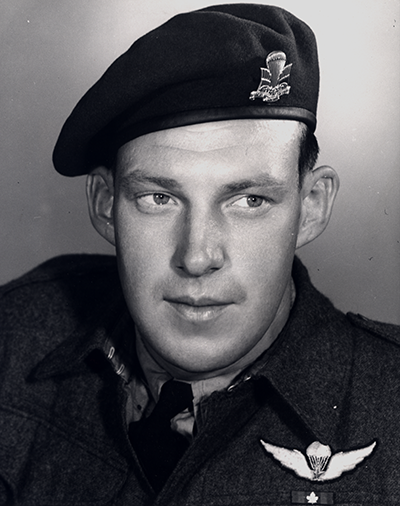Frederick George Topham
As stated in the following London Gazette citation, Frederick George Topham is a recipient of the Victoria Cross. This medal is awarded for the most conspicuous bravery, a daring or pre-eminent act of valour, or self-sacrifice or extreme devotion to duty in the presence of the enemy.
Victoria Cross - Second World War, 1939-1945

Frederick George Topham was born in Toronto, Ontario, on 10 August 1917. In March 1945, Corporal Topham was serving as a medical orderly in the 1st Canadian Parachute Battalion. At that time, the battalion was part of the 3rd Parachute Brigade of the British Army’s 6th Airborne Division. On the morning of 24 March 1945, parachute and glider-borne troops of the 6th Airborne Division landed on the east bank of the Rhine River, not far from the city of Wesel in Germany. These landings were carried out in support of assault operations begun the night before by the 1st Canadian and 2nd British Armies to cross to the East bank of the river. After the 1st Canadian Parachute Battalion landed just north of Diersfordt Wood, Corporal Topham heard a cry for help from a wounded man who was in the open. Two medical orderlies who went out in succession to treat the wounded man were killed. Immediately afterward and on his own initiative, Topham went forward through intense German fire to assist the casualty. As he treated the wounded man, Topham was himself shot through the nose, but continued to give first aid despite the severe bleeding and pain of his own injury. He was then able to carry the wounded man to shelter through continuous fire. Refusing treatment for his wound, Corporal Topham continued to assist the wounded for two more hours, by which time all casualties had been evacuated to safety. Although he finally consented to have his nose dressed, he refused to be evacuated with the other wounded. Later, alone and again under enemy fire, Topham rescued three soldiers from a burning machine gun carrier that threatened to explode, brought them to safety, and arranged for the evacuation of the two men who survived.
For his courageous and selfless devotion to his comrades, Corporal Topham was awarded the Victoria Cross. He died in Toronto on 31 May 1974.
Citation
“On 24th March 1945, Corporal Topham, a medical orderly, parachuted with his Battalion on to a strongly defended area east of the Rhine. At about 1100 hours, whilst treating casualties sustained in the drop, a cry for help came from a wounded man in the open. Two medical orderlies from a field ambulance went out to this man in succession but both were killed as they knelt beside the casualty.
Without hesitation and on his own initiative, Corporal Topham went forward through intense fire to replace the orderlies who had been killed before his eyes. As he worked on the wounded man, he was himself shot through the nose. In spite of severe bleeding and intense pain, he never faltered in his task. Having completed immediate first aid, he carried the wounded man steadily and slowly back through continuous fire to the shelter of a wood.
During the next two hours Corporal Topham refused all offers of medical help for his own wound. He worked most devotedly throughout this period to bring in wounded, showing complete disregard for the heavy and accurate enemy fire. It was only when all casualties had been cleared that he consented to his own wound being treated.
His immediate evacuation was ordered, but he interceded so earnestly on his own behalf that he was eventually allowed to return to duty.
On his way back to his company he came across a carrier, which had received a direct hit. Enemy mortar bombs were still dropping around, the carrier itself was burning fiercely and its own mortar ammunition was exploding. An experienced officer on the spot had warned all not to approach the carrier.
Corporal Topham, however, immediately went out alone in spite of the blasting ammunition and enemy fire, and rescued the three occupants of the carrier. He brought these men back across the open and, although one died almost immediately afterwards, he arranged for the evacuation of the other two, who undoubtedly owe their lives to him.
This N.C.O. showed sustained gallantry of the highest order. For six hours, most of the time in great pain, he performed a series of acts of outstanding bravery and his magnificent and selfless courage inspired all those who witnessed it.”